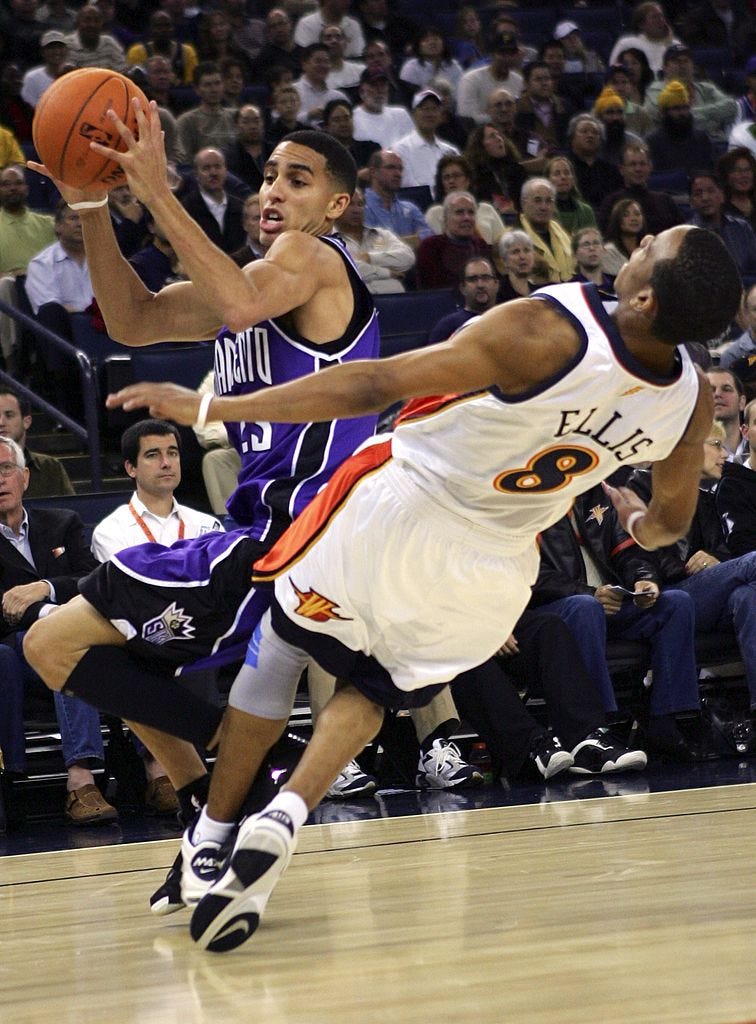Kevin Martin, Monta Ellis and the evolution of the NBA
A retrospective on the moods at play in the 2007 NBA Most Improved Player award voting.
Good morning. Are we at the point of the quarantine to dig into Carly Rae Jepson’s back catalog? Absolutely. Let’s Tug of War.

Getty Images Sport
It’s important to keep perspective on the three-point revolution brought to bear by Stephen Curry, Steve Kerr and the Golden State Warriors in 2015. It’s so often framed as a sudden moment: a stroke of individual genius — a player’s undeniable, singular skill and a coach’s bravery in diving into it fully. But of course it didn’t happen like that. The revolution was an evolution. The league had many actors moving toward full investment in the brutal efficiency of basketball’s math. The Warriors did it best, and they did it so well that it felt revolutionary.
The speed of the transformation of the league once the Warriors won the 2015 championship is illustrated by the fact that the previous era of guard play was in some way signified by a guy who played with Curry in Oakland, Monta Ellis. Ellis was never an All-Star, so we can’t say he defined that era’s guard play. (Kobe Bryant did that.) But Monta was a protagonist in the single most representative battle over efficiency and volume in the 2007 NBA Most Improved Player race.
In that race, the closest finish of all-time, Ellis beat Kevin Martin by three points. Monta earned three more first-place votes, while Martin had more second- and third- place votes. Ellis, then a second-year player out of high school, nearly doubled his minutes and saw representative increases in his production while achieving league-average efficiency (with poor but infrequent shooting from deep). Martin was in his third year and had started about half the season for a playoff team the year prior; in 2006-07, he doubled his scoring with a 40% increase in minutes and maintained elite efficency (.615 True Shooting percentage).
Monta went from a nothing rookie to a solid scorer on middling efficiency. Martin went from a roleplaying scorer to star scorer on outrageous efficiency. Voters didn’t care all that much about efficiency in this race, though: they didn’t respect how important it was that Martin became a 20-point scorer with Steve Nash-like efficiency. There was also something buzzing around the media that frankly didn’t believe what Martin did was real, or that it was as valid as the more traditional isolation-heavy style that two-guards were often trotting out at the time.
This aura of difference followed Martin, and the fact that the Kings fell into the tank in 2006-07 and never fully climbed out didn’t help. Martin became a poster boy for accusation of empty stats for losing teams. (Martin is, of course, one of the few players to have a playoff game-winner against the Popovich-era Spurs.) Instead, Martin is really the poster boy for the importance of supreme efficiency: with modest increases in shots per game, he put up huge numbers. He showed the gains that could be achieved by a two-guard by taking more of the good shots that are efficient and count for more points. He was one of several players of that decade to point to the new future without quite sparking it.
The Kings moved on from Martin shortly after drafting Tyreke Evans over Steph Curry in 2009. Martin had some good years for the Rockets, Thunder (never forget that K-Mart was in both Houston’s Tracy McGrady trade and its James Harden trade) and Wolves. He owns an Australian team.
In a weird twist of fate, Monta and his 2007 Most Improved trophy were flipped out of Oakland when the Warriors drafted Klay Thompson, a Martinesque two-guard (albeit with a cleaner stroke and defensive chops), to star alongside Curry. Monta, once a decorated bulwark against the evolution from an isolation and pull-up league, was uprooted by the revolution itself. It’s funny how these things work out.
As it was, Monta just missed playing with the next evolution of the league — Giannis Antetokounmpo — in Milwaukee. The lore of this league is powerful.
The Art of Suffering
Links
Big blessings to Jeremy Lin on darkness, blame and coronavirus.
Late Monday, CNBC reported that Vox Media will furlough 100 staff members, including 30 editorial employees largely drawn from SB Nation and Eater, two verticals who are most impacted by the coronavirus advertising and content crunch. I’m really, really sorry for all of my friends there who will be impacted.
Zach Lowe’s annual Luke Walton All-Stars. Always a great read.
Mike Prada digs in to determine the best NBA team to never win a title. He starts with 16 teams that flamed out too early.
Analyzing the skill sets of the first-round prospects in this week’s WNBA Draft. A quick reference guide to the top 40 prospects.
On the end of the John Paxson era. ($)
Royce White is trying to break into mixed martial arts.
Lindsay Gibbs on the biggest problem with Sunday’s H.O.R.S.E. broadcast.
We’re learning some more about the MJ/Bulls documentary debuting Sunday as the filmmaker does the media rounds.
This Annie Lowery piece on the curse of the millennials hits hard.


